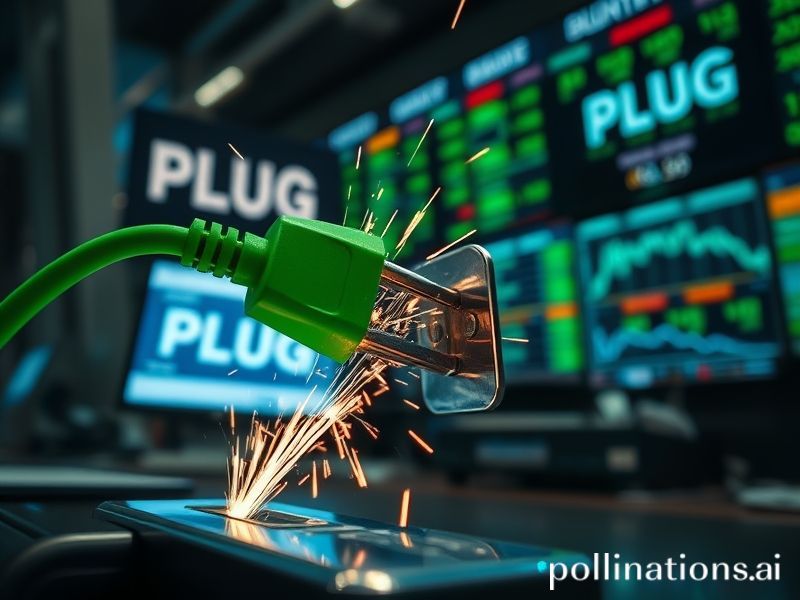Plug Stock: How a Hydrogen Dream Became the World’s Most Diplomatic Casino Chip
Plug Power’s shares—ticker PLUG, affectionately nick-named “plug stock” by traders who like their acronyms short and their existential crises shorter—have spent the last year staging a masterclass in how renewable hope collides with fossil-fuel reality. From Frankfurt’s glass-walled trading floors to the fluorescent back-rooms of Manila’s brokerage houses, the hydrogen darling has become a global Rorschach test: optimists see a green future, cynics see a convenient way to lose money, and everyone else sees a stock chart that looks like an EKG during cardiac arrest.
The premise is almost charmingly naïve: replace every belching diesel forklift in an Amazon warehouse with a silent hydrogen cell, then scale that idea until container ships the size of small cities glide into Rotterdam emitting nothing but distilled water and smugness. Plug has been selling that fairy tale since the Clinton administration, when hydrogen was “five years away” right alongside fusion reactors and a polite American electorate. Three decades on, Plug is still five years away, but the PowerPoint slides have gotten prettier and the government subsidies considerably fatter.
Europe, bless its regulatory heart, has been the most enthusiastic sugar-daddy. Brussels has ladled out €5.4 billion in hydrogen grants, some of which actually landed in Plug’s American lap after a detour through Irish shell companies with no employees but surprisingly well-paid directors. The French, never ones to miss a strategic misfire, have announced plans to turn the former coal port of Le Havre into a “hydrogen hub,” apparently believing that if you simply rename rust, it becomes green. German utilities—fresh from pretending Russian gas was merely a “transition fuel”—are now pretending hydrogen will heat Bavarian homes, a claim roughly as credible as a chocolate teapot.
Across the Pacific, Tokyo’s bureaucrats have drafted Plug into their “GX” green-transformation blueprint, which sounds like a new gaming console but is actually an attempt to keep Toyota relevant while China eats everyone’s EV lunch. Meanwhile, South Korea’s chaebols have promised to build “the world’s largest hydrogen ecosystem,” a phrase that conjures images of whales with fuel cells but mostly means more concrete in Ulsan. When Korean retail investors piled into PLUG during the 2021 meme-stock bacchanal, they briefly pushed the price above $75, proving that national pride plus boredom is a combustible mix.
Then came 2023, the year gravity remembered its job. Plug missed revenue targets, burned cash faster than a Russian pipeline, and disclosed “material weakness” in its accounting—the corporate equivalent of telling your spouse you’ve “misplaced” the rent money. The stock dropped 75 %, vaporizing roughly the GDP of Iceland. In a saner era, that would have been the end; in ours, the U.S. government simply upped its hydrogen tax credit by another $3 per kilo, proving once again that the best business model is lobbying.
Still, to dismiss Plug entirely is to miss the broader tragicomedy. Every cargo-cult hydrogen announcement from Jakarta to Johannesburg is less about chemistry and more about geopolitics: a way for nations to signal virtue while extending the life of legacy energy giants. Hydrogen lets petrostates rebrand natural gas as “blue,” coal exporters as “turquoise,” and everyone else as merely temporarily embarrassed renewables. In that sense, PLUG isn’t just a stock; it’s a diplomatic fig leaf with a QR code.
And so the saga limps on. This week Plug announced a joint venture with a Saudi sovereign fund—because if anyone understands sustainable energy, it’s a country that pumps ten million barrels a day and hosts an annual camel beauty pageant. Shares spiked 18 % on the news, then promptly gave back half the gains when traders remembered they still can’t spell “electrolyzer” without Google. Somewhere in the metaverse, a Finnish pension fund is rebalancing away, while a Bangkok day-trader YOLOs his wedding savings on margin.
The moral, dear reader, is as old as tulip bulbs: humanity will always invent new ways to bet on the future, then act shocked when the future arrives late and drunk. Plug stock may yet power the planet or simply power a thousand PowerPoint decks destined for the recycle bin. Either way, the joke’s on us—for believing, for doubting, and worst of all, for watching the ticker instead of the thermometer.







